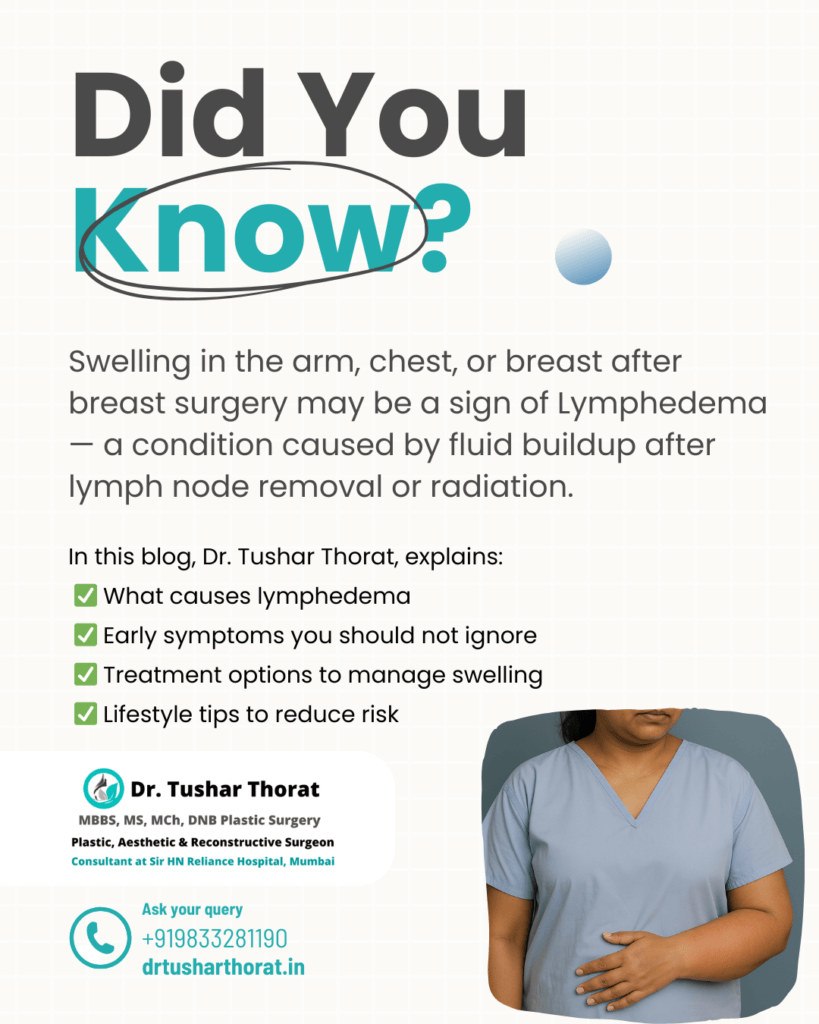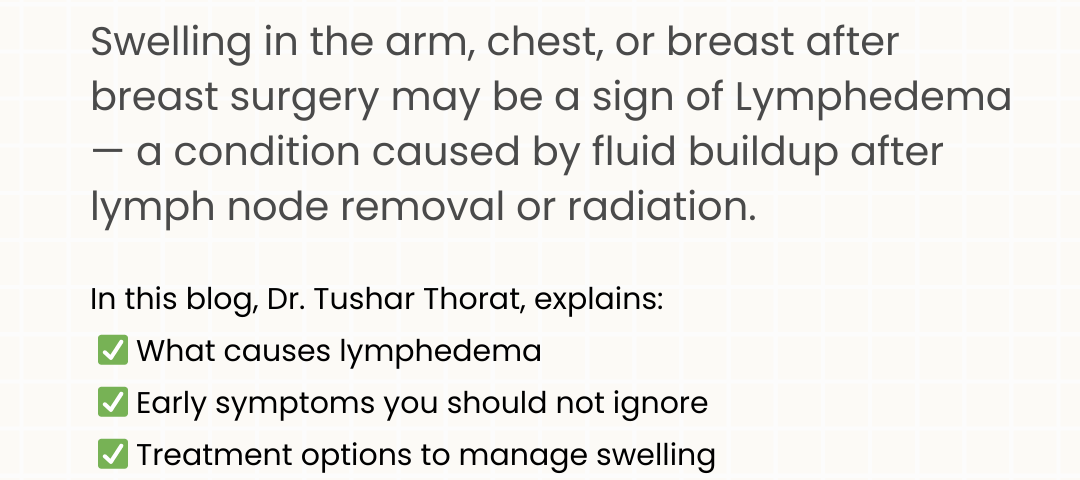
Breast cancer surgery saves lives, but for some women, it may also bring challenges afterward. One such challenge is lymphedema – a condition that causes swelling in the arm, chest, or breast due to fluid buildup.
Many women are unaware of this condition until it develops. Early detection and proper management are key to avoiding long-term complications. In this blog, we’ll cover everything you need to know about lymphedema after breast surgery — from causes and symptoms to treatment options and FAQs.
What is Lymphedema?
Lymphedema is swelling caused by the accumulation of lymphatic fluid. The lymphatic system acts like a drainage network in our body, moving waste, toxins, and excess fluid away from tissues.
When lymph nodes are removed or damaged during breast cancer surgery or radiation, the system may not function properly. This leads to fluid buildup in the arm, chest, or breast, resulting in lymphedema.
Causes of Lymphedema After Breast Surgery
Lymphedema is most often linked to:
- Lymph node removal during mastectomy or lumpectomy
- Radiation therapy that damages lymphatic vessels
- Infections or injuries in the affected arm
- Scarring around lymph vessels
- Obesity, which increases pressure on lymphatic circulation
- Cancer recurrence, though this is less common
Symptoms of Lymphedema
Lymphedema can appear weeks, months, or even years after surgery. Common symptoms include:
- Swelling in the arm, breast, chest, or hand
- A feeling of heaviness, tightness, or fullness in the arm
- Stiffness or reduced flexibility in the shoulder or wrist
- Tingling or aching pain
- Changes in skin texture (hardness or thickening)
- Recurrent skin infections (cellulitis)
Stages of Lymphedema
Doctors usually classify lymphedema in stages, based on severity:
- Stage 0 (Latency): No visible swelling, but patients may feel heaviness or tightness.
- Stage 1 (Mild): Swelling that reduces with rest or elevation.
- Stage 2 (Moderate): Persistent swelling that does not reduce easily.
- Stage 3 (Severe): Advanced swelling with skin thickening and reduced mobility.
Can Lymphedema Be Prevented?
While not always preventable, the risk can be reduced with lifestyle care:
- Avoid blood pressure checks, injections, or blood draws on the affected arm.
- Protect your skin from cuts, burns, or insect bites.
- Maintain a healthy weight.
- Do gentle exercises and stretching as advised by your surgeon.
- Avoid carrying very heavy bags with the affected arm.
- Wear loose-fitting clothes and avoid tight jewelry.
Treatment Options for Lymphedema
There is no permanent cure, but with proper treatment, symptoms can be managed effectively.
1. Conservative Treatments
- Manual Lymphatic Drainage (MLD): A specialized massage technique to improve lymph flow.
- Compression Therapy: Elastic sleeves or bandages reduce swelling.
- Exercise & Physiotherapy: Gentle arm and shoulder exercises to promote circulation.
- Skin Care: Preventing infections with good hygiene and moisturization.
2. Advanced Medical Treatments
- Decongestive Therapy: A combination of massage, bandaging, exercise, and skincare.
- Medications: To control infections or pain.
-
Surgical Options (in severe cases):
- Lymphovenous Bypass (LVB): Connecting lymph vessels to nearby veins.
- Vascularized Lymph Node Transfer (VLNT): Transferring healthy lymph nodes from another part of the body.
Living With Lymphedema
With the right management, patients can lead normal, active lives. Early recognition is crucial. The sooner swelling is detected, the more effectively it can be controlled.
FAQs on Lymphedema After Breast Surgery
Q1. How soon after breast surgery can lymphedema occur?
Lymphedema may develop immediately, within weeks, or even several years after surgery or radiation.
Q2. Is lymphedema permanent?
Lymphedema is usually a chronic condition. While it may not go away completely, proper treatment can control symptoms and prevent progression.
Q3. How do I know if my swelling is lymphedema or just weight gain?
Weight gain usually causes overall increase in size, while lymphedema causes swelling in one arm, hand, or chest, often with heaviness and tightness. A doctor can confirm with clinical exam and imaging.
Q4. Does exercise make lymphedema worse?
No. In fact, light exercise improves circulation and lymph drainage. Always follow physiotherapy guidance.
Q5. Can lymphedema be cured with surgery?
Surgical techniques like lymphovenous bypass and lymph node transfer may help in severe cases, but most patients benefit from conservative therapies.
Q6. What happens if lymphedema is left untreated?
Untreated lymphedema may worsen over time, leading to skin thickening, infections, and restricted arm movement.
Q7. What foods should I avoid if I have lymphedema?
There’s no strict diet, but reducing salt, processed foods, and maintaining a healthy weight helps manage swelling.
Why Choose Dr. Tushar Thorat for Lymphedema Care in Mumbai?
Dr. Tushar Thorat is an experienced Plastic & Reconstructive Surgeon in Mumbai, with expertise in breast reconstruction and post-surgical rehabilitation. He provides holistic care to help women recover not only physically, but also emotionally, after breast cancer treatment.
Hospitals:
Sir HN Reliance Hospital, Mumbai
Saifee Hospital, Girgaon
Bhatia Hospital, Mumbai
Contact: +91 9833281190 | +91 8169429044
www.drtusharthorat.in






